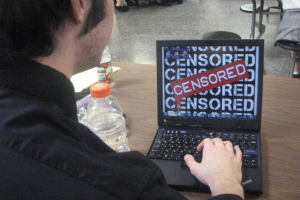Read the Opinion story on the internet censorship acts here.
Two acts, the PROTECT IP Act and the Stop Online Piracy Act (SOPA), have been introduced to Congress, and may change how Internet users experience the web forever.
The Fight for the Future organization stands against the proposed bills. According to their website, “the bills would criminalize posting all sorts of standard web content — music playing in the background of videos, footage of people dancing, kids playing videogames, and posting videos of people playing cover songs.”
According to American Censorship’s website, “The links and content you share on social networks will be carefully monitored and possibly censored.”
Director of Technology Greg Russell is skeptical of the bills. “It seems like they could be prone to easy corruption,” Russell said.
Students like freshman Brady Fritz are opposed to the bills. “They’re stopping kids from doing what they want to do,” Fritz said.
On May 12, 2011, Vermont Senator Patrick Leahy and 11 initial bipartisan co-sponsors introduced the PROTECT IP Act, according to GovTrack’s website.
According to the United States Senate bill S.968, the purpose of the PROTECT IP Act is “to prevent online threats to economic creativity and theft of intellectual property,” among other reasons. The purpose of the bill provides the acronym for its title.
This act gives the entertainment industry the power to censor the Internet, according to American Censorship’s website. The U.S. government also has the power to make Internet providers in the U.S. block access to infringing domain names.
“At this point, while I would agree that people need to have their copyright protected, I’m not so sure that this provides a great way to do it,” Russell said.
According to American Censorship, the PROTECT IP Act also gives private corporations and the government the ability to cut off funds to infringing websites.
The Senate Judiciary Committee passed the bill, but Oregon Senator Ron Wyden placed a hold on it.
According to the United States Senate’s website, a hold is “an informal practice by which a Senator . . . may filibuster any motion to proceed to consider . . . a particular bill or other measure.”
Texas Representative Lamar Smith and a bipartisan group of 12 initial co-sponsors introduced a similar version of the bill in the House of Representatives, SOPA, on Oct. 26, 2011.
According to the United States House of Representatives bill H.R.3261, the purpose of the SOPA is “to promote prosperity, creativity, entrepreneurship, and innovation by combating the theft of U.S. property, and for other purposes.” This act would help enforce copyright laws on the Internet to prevent things such as piracy or copyright infringement.
According to section two, paragraph one of SOPA, “nothing in this act shall be construed to impose a prior restraint on free speech or the press protected under the first amendment to the Constitution.”
Senior Alex Burdeshaw thinks otherwise. “I think this is blatantly against the first amendment, but you can say that all you want and Congress will do whatever they want anyway,” Burdeshaw said.
Junior Carol Zubrowski echoes these sentiments. “I don’t think it’s going to happen because it violates the right to free speech,” Zubrowski said.
According to Fight for the Future’s website, these acts will “threaten the security and stability of the global Domain Name System” by “meddling with the inner workings of the net.”
Fight for the Future also states, “PROTECT IP won’t stop piracy, but it will introduce vast potential for censorship and abuse while making the web less safe and less reliable.”
According to American Censorship’s website, “the government and corporations could block any site, foreign or domestic, just for one infringing link. Sites like YouTube, Twitter, and Facebook would have to censor their users or get shut down since they become liable for everything users post.”
For this reason, websites like Google, Yahoo, eBay, Facebook, Tumblr, Twitter, LinkedIn, AOL, and Zynga oppose SOPA and the PROTECT IP Act, according to CNET’s website.
“Ordinary users could go to jail for five years for posting any copyrighted work-even just singing a pop song,” according to American Censorship.
Adam Kuester is a News Editor for The Patriot and jcpatriot.com



